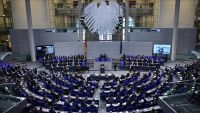When Pope Francis speaks before the U.S. Congress in September, will he take up immigration reform? "If what's happened in recent months serves as a testament to the purpose of Pope Francis," says Gabriel Salguero, president of the National Latino Evangelical Coalition, "he'll defend the same things as the Gospel: the poor, the immigrants and, of course, life."
In September, when Pope Francis speaks before the U.S. Congress, will he advocate to legalize the status of millions of undocumented immigrants in this country?
If so, he'll join a growing religious movement to reform the U.S. immigration system, says Gabriel Salguero, leader of the National Latino Evangelical Coalition and a board member of the National Association of Evangelicals.
"From the evangelical perspective, we expect that Pope Francis will use his visit to the U.S. Congress to advocate for the most vulnerable, such as the immigrants," he said.
Salguero was in Houston last weekend to participate in Call to Action on Immigration, which backed President Obama's executive actions on immigration. As head of the NLEC, he represents the roughly 7 million Latino evangelical Christians who live in the U.S.
He spoke to reporter Olivia P. Tallet in Spanish. Here's a translated excerpt from that interview.
Question: What makes you think that Pope Francis will advocate for immigrants?
Answer: I feel hopeful because Pope Francis is coming to America and he said he'd like to come in through the border with Mexico. Top leaders of all religions are in favor of resolving this issue. We're a nation of laws, but we're also a nation of immigrants. That's enough. Hopefully the Pope's visit, along with the evangelical voices, will have an impact on the House and the Senate to move this forward.
The original Spanish version of this interview, "Evangélicos latinos esperan que el Papa abogue por inmigrantes ante Congreso," appeared in La Voz, the Chronicle's Spanish-language publication.
Q: What do you think the Pope will do before Congress?
A: If what's happened in recent months serves as a testament to the purpose of Pope Francis, he'll defend the same things as the Gospel: the poor, the immigrants and, of course, life. I think the Pope, as a spiritual leader, will echo what the Catholic bishops have already said in the U.S. The National Association of Evangelicals, to which the National Latino Evangelical Coalition belongs, is 90 percent Anglo. I'm part of its board of directors, and it has also asked for an immigration reform.
So I believe the Pope will make that spiritual call to try to integrate those nearly 12 million people [undocumented immigrants] created in the image of God, whether Latinos, Asians, Irish, Africans or Jamaicans... For us [the question] is what can we do to improve the situation of these people created in the image of God and who are in a political limbo.
Q: You've called it a political limbo. Why should churches be involved in this?
A: For us, this is a moral issue. We're evangelicals, and we're usually branded as social conservatives, but this is not a partisan issue. It's a service. It's what Jesus taught us in Matthew 25 when He said: "I was a stranger and yet took me in."
We don't take sides with Republicans nor with Democrats. We've spent years talking with Republicans and Democrats about a bipartisan immigration reform because as pastors, we want to serve our communities. We want to welcome them to our churches with Christian love and affection while laws are being reformed.
The reality is that most religious voices want immigration reform. It doesn't matter whether it's Catholic bishops, Anglos or Hispanic evangelicals or Jews.
I spoke at the [U.S.] Chamber of Commerce last year, and they also want a reform. And though we had hopes, it didn't happen last year.
Q: Why do you think it didn't happen?
A: It takes political will. The lack of progress on an immigration reform is illogical. There's no vision of the future and no memory of the past. This has always been a country of immigrants, of residents who get along, of integrated families, so I think that what we really need is leadership.
Q: Don't you think that the president's executive actions are a step forward in all this?
A: Yes, and the Latino evangelical community, our coalition, supports the executive actions. But we also want a bipartisan comprehensive reform [with a path to citizenship]. We don't want more excuses, no more political rhetoric. We need leadership to solve this problem. Our [immigration] laws are from the 20th century, and in the 21st century we need to modernize the immigration system in the United States.
Houston Chronicle









